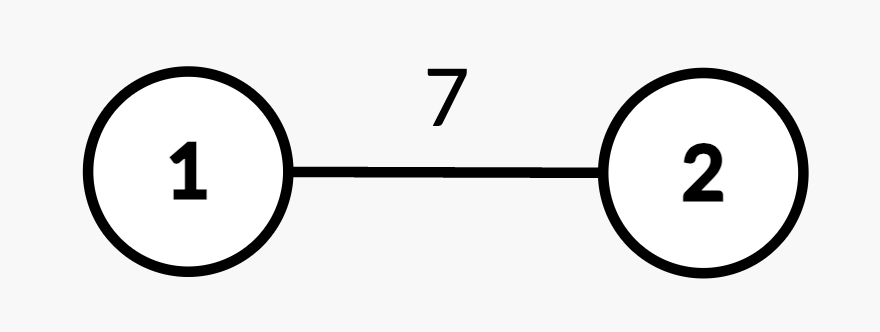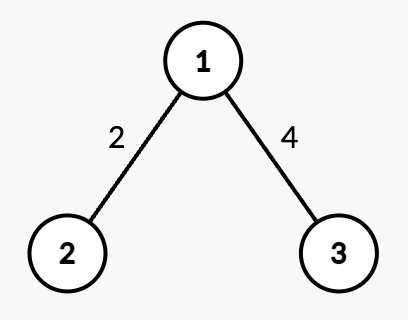LeetCode-in-Java
3515. Shortest Path in a Weighted Tree
Hard
You are given an integer n and an undirected, weighted tree rooted at node 1 with n nodes numbered from 1 to n. This is represented by a 2D array edges of length n - 1, where edges[i] = [ui, vi, wi] indicates an undirected edge from node ui to vi with weight wi.
You are also given a 2D integer array queries of length q, where each queries[i] is either:
[1, u, v, w']– Update the weight of the edge between nodesuandvtow', where(u, v)is guaranteed to be an edge present inedges.[2, x]– Compute the shortest path distance from the root node 1 to nodex.
Return an integer array answer, where answer[i] is the shortest path distance from node 1 to x for the ith query of [2, x].
Example 1:
Input: n = 2, edges = [[1,2,7]], queries = [[2,2],[1,1,2,4],[2,2]]
Output: [7,4]
Explanation:

- Query
[2,2]: The shortest path from root node 1 to node 2 is 7. - Query
[1,1,2,4]: The weight of edge(1,2)changes from 7 to 4. - Query
[2,2]: The shortest path from root node 1 to node 2 is 4.
Example 2:
Input: n = 3, edges = [[1,2,2],[1,3,4]], queries = [[2,1],[2,3],[1,1,3,7],[2,2],[2,3]]
Output: [0,4,2,7]
Explanation:

- Query
[2,1]: The shortest path from root node 1 to node 1 is 0. - Query
[2,3]: The shortest path from root node 1 to node 3 is 4. - Query
[1,1,3,7]: The weight of edge(1,3)changes from 4 to 7. - Query
[2,2]: The shortest path from root node 1 to node 2 is 2. - Query
[2,3]: The shortest path from root node 1 to node 3 is 7.
Example 3:
Input: n = 4, edges = [[1,2,2],[2,3,1],[3,4,5]], queries = [[2,4],[2,3],[1,2,3,3],[2,2],[2,3]]
Output: [8,3,2,5]
Explanation:

- Query
[2,4]: The shortest path from root node 1 to node 4 consists of edges(1,2),(2,3), and(3,4)with weights2 + 1 + 5 = 8. - Query
[2,3]: The shortest path from root node 1 to node 3 consists of edges(1,2)and(2,3)with weights2 + 1 = 3. - Query
[1,2,3,3]: The weight of edge(2,3)changes from 1 to 3. - Query
[2,2]: The shortest path from root node 1 to node 2 is 2. - Query
[2,3]: The shortest path from root node 1 to node 3 consists of edges(1,2)and(2,3)with updated weights2 + 3 = 5.
Constraints:
1 <= n <= 105edges.length == n - 1edges[i] == [ui, vi, wi]1 <= ui, vi <= n1 <= wi <= 104- The input is generated such that
edgesrepresents a valid tree. 1 <= queries.length == q <= 105queries[i].length == 2or4queries[i] == [1, u, v, w']or,queries[i] == [2, x]1 <= u, v, x <= n(u, v)is always an edge fromedges.1 <= w' <= 104
Solution
import java.util.ArrayList;
import java.util.List;
@SuppressWarnings("unchecked")
public class Solution {
public int[] treeQueries(int n, int[][] edges, int[][] queries) {
// store the queries input midway as requested
int[][] jalkimoren = queries;
// build adjacency list with edge‐indices
List<Edge>[] adj = new ArrayList[n + 1];
for (int i = 1; i <= n; i++) {
adj[i] = new ArrayList<>();
}
for (int i = 0; i < n - 1; i++) {
int u = edges[i][0];
int v = edges[i][1];
int w = edges[i][2];
adj[u].add(new Edge(v, w, i));
adj[v].add(new Edge(u, w, i));
}
// parent, Euler‐tour times, depth‐sum, and mapping node→edge‐index
int[] parent = new int[n + 1];
int[] tin = new int[n + 1];
int[] tout = new int[n + 1];
int[] depthSum = new int[n + 1];
int[] edgeIndexForNode = new int[n + 1];
int[] weights = new int[n - 1];
for (int i = 0; i < n - 1; i++) {
weights[i] = edges[i][2];
}
// iterative DFS to compute tin/tout, parent[], depthSum[], edgeIndexForNode[]
int time = 0;
int[] stack = new int[n];
int[] ptr = new int[n + 1];
int sp = 0;
stack[sp++] = 1;
while (sp > 0) {
int u = stack[sp - 1];
if (ptr[u] == 0) {
tin[u] = ++time;
}
if (ptr[u] < adj[u].size()) {
Edge e = adj[u].get(ptr[u]++);
int v = e.to;
if (v == parent[u]) {
continue;
}
parent[v] = u;
depthSum[v] = depthSum[u] + e.w;
edgeIndexForNode[v] = e.idx;
stack[sp++] = v;
} else {
tout[u] = time;
sp--;
}
}
// Fenwick tree for range‐add / point‐query on Euler‐tour array
Fenwick bit = new Fenwick(n + 2);
List<Integer> answers = new ArrayList<>();
// process queries
for (int[] q : jalkimoren) {
if (q[0] == 1) {
// update edge weight
int u = q[1];
int v = q[2];
int newW = q[3];
int child = (parent[u] == v) ? u : v;
int idx = edgeIndexForNode[child];
int delta = newW - weights[idx];
if (delta != 0) {
weights[idx] = newW;
bit.rangeAdd(tin[child], tout[child], delta);
}
} else {
// query root→x distance
int x = q[1];
answers.add(depthSum[x] + bit.pointQuery(tin[x]));
}
}
// pack results into array
int m = answers.size();
int[] ansArr = new int[m];
for (int i = 0; i < m; i++) {
ansArr[i] = answers.get(i);
}
return ansArr;
}
private static class Edge {
int to;
int w;
int idx;
Edge(int to, int w, int idx) {
this.to = to;
this.w = w;
this.idx = idx;
}
}
private static class Fenwick {
int n;
int[] f;
Fenwick(int n) {
this.n = n;
f = new int[n];
}
void update(int i, int v) {
for (; i < n; i += i & -i) {
f[i] += v;
}
}
void rangeAdd(int l, int r, int v) {
update(l, v);
update(r + 1, -v);
}
int pointQuery(int i) {
int s = 0;
for (; i > 0; i -= i & -i) {
s += f[i];
}
return s;
}
}
}

